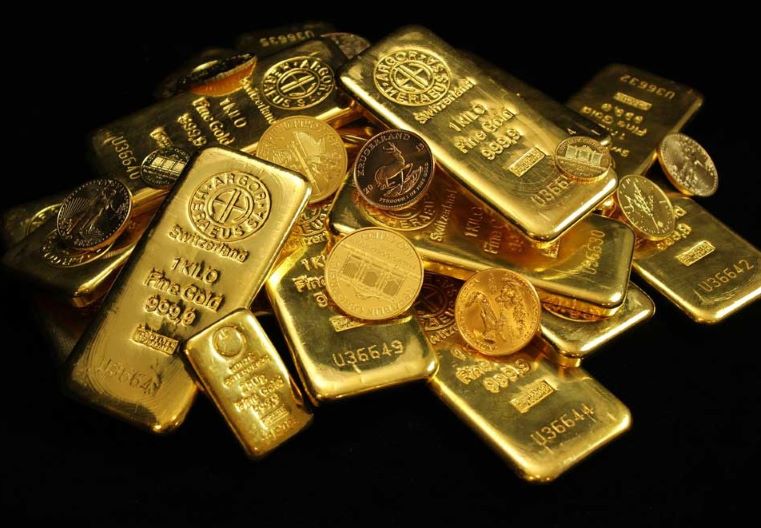Best Brokers for Precious Metals 2026
Ultimate Guide to Choosing the Best Precious Metals Brokers
Investing in precious metals has long been regarded as a reliable method for preserving wealth and diversifying investment portfolios.
This comprehensive guide aims to provide detailed insights into what to look for in brokers, various types of precious metals investments, factors affecting prices, storage options, tax implications, and more.
By understanding these aspects, you can make informed decisions and maximize the benefits of your investments.
Why Invest in Precious Metals?
Investing in metals like gold, silver, platinum, and palladium offers several significant advantages:
- Hedge Against Inflation: Precious metals often retain their value better than currencies in times of inflation.
- Diversification: Including metals in your investment portfolio can reduce risk and improve overall performance.
- Tangible Assets: Unlike stocks or bonds, metals are physical assets that you can hold.
- High Liquidity: Precious metals can be easily bought and sold in various forms, such as bars, coins, and ETFs.

What to Look for in a Broker
Choosing the right broker is crucial for maximizing the benefits of investing in precious metals.
Here are some key factors to consider:
Security and Trustworthiness
- Reputation: Seek companies with a strong reputation and positive reviews from other investors.
- Regulation: Ensure it is regulated by a reputable authority.
- Security Measures: Check for robust security measures to protect your investments and personal information.
Fees and Costs
- Transaction Fees: Compare the transaction fees charged by different firms.
- Storage Fees: If you opt for storage services, be aware of the associated costs.
- Additional Costs: Be mindful of any hidden fees, such as withdrawal or inactivity fees.
Range of Products
- Variety of Metals: The trading firm should offer a range of precious metals to invest in.
- Investment Options: Look for brokers that provide various investment options, including physical metals, ETFs, and mining stocks.
Customer Support
- Accessibility: Ensure client support is accessible and responsive.
- Educational Resources: A good broker should offer educational resources to help you make informed decisions.
Platform and Tools
- User-Friendly Platform: The trading platform should be easy to navigate.
- Research Tools: Access to research tools and market data is crucial for making informed decisions.
Pros and Cons of Using Metals Brokers
Choosing to invest through a dealer comes with its set of advantages and disadvantages.
• Professional advice and support.
• Secure storage options for physical metals.
• Convenient online trading platforms.
• Regulatory protection in case of disputes.
• Risk of choosing an unreliable company.
• Potential for conflicts of interest.
• Limited control over physical assets.
• Dependence on its platform for trading.
Types of Precious Metals Investments
When investing in precious metals, you have several options to decide from.
Each type has its benefits and drawbacks:
Physical Metals
Pros:
- Tangible asset.
- No counterparty risk.
- Can be used as a hedge against inflation.
Cons:
- Requires secure storage.
- Less liquid than other forms of investment.
- Higher transaction costs.
Exchange-Traded Funds (ETF)
Pros:
- High liquidity.
- Lower transaction costs.
- Easy to buy and sell.
Cons:
- Indirect ownership.
- Management fees.
- Market risk.
Futures and Options
Pros:
- Potential for high returns.
- Leverage allows for larger positions with less capital.
- Can hedge other investments.
Cons:
- High risk due to leverage.
- Requires significant market knowledge.
- Potential for significant losses.
Mining Stocks
Pros:
- Exposure to the precious metals market.
- Potential for dividends.
- Higher return potential.
Cons:
- Company-specific risks.
- Indirect exposure to metals.
- Requires stock market knowledge.
Factors Affecting Metals Prices
Understanding the factors that influence precious metals prices is crucial for making informed investment decisions.
Some key factors include:
Economic Data
- Inflation Rates: Higher inflation often leads to higher precious metals prices.
- Interest Rates: Lower interest rates tend to increase demand for metals.
Geopolitical Events
- Political Instability: Uncertainty can drive investors to seek safe-haven assets like gold.
- Wars and Conflicts: These events can disrupt supply chains and affect prices.
Market Demand and Supply
- Industrial Demand: Precious metals are used in various industries, impacting their demand.
- Mining Production: Changes in mining output can impact supply and prices.
Currency Strength
- U.S. Dollar: Precious metals are regularly priced in USD, so a weaker dollar can boost prices.
- Exchange Rates: Fluctuations in exchange rates can also impact prices.
Historical Performance of Metals
Understanding historical performance can provide valuable insights into the potential future performance of precious metals.
Gold
- Long-Term Stability: Gold has historically maintained its value over long periods.
- Crisis Performance: Gold prices tend to rise during economic downturns and geopolitical instability.
Silver
- Industrial Use: Silver has a higher industrial demand compared to gold, influencing its price movements.
- Volatility: Silver prices are generally more volatile than gold, providing higher short-term profit opportunities but also higher risks.
Platinum and Palladium
- Industrial Demand: Both metals are heavily used in automotive and industrial applications.
- Supply Constraints: Limited supply and high demand can lead to significant price spikes.
Regulatory Environment
Understanding the regulatory environment can help investors ensure they are working with a trustworthy and compliant company.
United States
- Regulatory Bodies: The Commodity Futures Trading Commission (CFTC) and the Securities and Exchange Commission (SEC) regulate precious metals trading.
- Compliance: Brokers must adhere to strict compliance standards, providing a level of security for investors.
European Union
- Regulatory Bodies: The European Securities and Markets Authority (ESMA) oversees regulations.
- MiFID II Compliance: Firms must comply with the Markets in Financial Instruments Directive II, which enhances investor protection.
Australia
- Regulatory Bodies: The Australian Securities and Investments Commission (ASIC) regulates trading.
- Strict Guidelines: Companies must follow strict guidelines to ensure fair and transparent trading.
Tips for New Investors
Start Small
- Manageable Investment: Begin with a small investment to understand the market dynamics.
- Learn and Adapt: Use initial investments to learn and adapt your strategy.
Diversify
- Spread Risk: Diversify your investments across different types of metals and other asset classes.
- Balanced Portfolio: A balanced portfolio can reduce risk and improve returns.
Stay Informed
- Market Trends: Stay updated on market trends and news that can impact precious metals prices.
- Research: Regular research can help you make informed investment decisions.
Investment Strategies
Buy and Hold
- Long-Term Growth: Purchase precious metals and hold them for long-term growth.
- Stability: Ideal for investors looking for stability and gradual value appreciation.
Short-Term Trading
- Quick Profits: Capitalize on short-term price movements for quick profits.
- Market Knowledge: Requires profound market knowledge and constant monitoring.
Hedging
- Risk Management: Use precious metals to hedge against other investments.
- Portfolio Protection: Protect your portfolio from market volatility and economic downturns.
Comparison with Other Investment Options
Stocks
- Volatility: Stocks are generally more volatile than metals.
- Growth Potential: Higher growth potential but also higher risk.
Bonds
- Stability: Bonds offer more stability, but lower returns compared to metals.
- Interest Rates: Bond prices are influenced by interest rate changes.
Real Estate
- Tangibility: Like precious metals, real estate is a tangible asset.
- Liquidity: Real estate is less liquid compared to metals.
Glossary of Terms
Bullion
- Definition: Physical gold and silver in the form of bars or coins.
- Usage: Commonly used for investment purposes.
Spot Price
- Definition: The current market price of a precious metal.
- Usage: Used to determine the immediate buying or selling price.
ETF
- Definition: Exchange-Traded Fund, a type of investment fund that is traded on stock exchanges.
- Usage: Provides exposure to precious metals without owning physical assets.
Futures Contract
- Definition: An agreement to buy or sell a specific amount of a commodity at a predetermined price at a specific time in the future.
- Usage: Used for hedging or speculative purposes.
Comprehensive Broker Comparison Table
| Broker | Key Features | Regulations | Other Features |
|---|---|---|---|
| Admirals | Low fees, diverse products | FCA, ASIC | Educational resources, demo accounts |
| ActivTrades | Advanced trading tools | FCA, CSSF | Multiple trading platforms |
| Amarkets | High leverage, fast execution | FSA | Competitive spreads |
| Axi | No deposit fees, tight spreads | ASIC, FCA | Excellent customer support |
| Axiory | Innovative technology | IFSC | High liquidity, transparent |
| BDSwiss | Multiple account types | CySEC, FSC | Webinars, market analysis |
| BlackBull Markets | Institutional-grade services | FMA | High-speed execution |
| CMTrading | Diverse trading instruments | FSCA, FSA | Social trading, webinars |
| DooPrime | Professional trading environment | FCA, ASIC | High leverage options |
| EasyMarkets | Fixed spreads, risk management tools | CySEC, ASIC | Negative balance protection |
| Fusion Markets | MT4 and MT5 platforms | ASIC, VFSC | Extensive market analysis |
| eToro | Social trading, copy trading | CySEC, FCA | User-friendly platform |
| Exness | Unlimited leverage | FCA, CySEC | Instant withdrawals |
| FBS | High leverage, promotions | IFSC, CySEC | Multiple account types |
| FP Markets | Raw spreads, fast execution | ASIC, CySEC | ECN pricing |
| Go Markets | Low commissions, tight spreads | ASIC | High leverage options |
| FX Giants | Diverse account types | FCA | Competitive pricing |
| FXOpen | ECN trading, low spreads | FCA, ASIC | Crypto trading options |
| FxPro | High liquidity, multiple platforms | FCA, CySEC | Negative balance protection |
| FXTM | High leverage, multiple accounts | FCA, CySEC | Educational resources |
| Globex360 | Advanced trading platforms | FSCA | Personalized support |
| Go Markets | Tight spreads, low commissions | ASIC, CySEC | Multiple trading platforms |
| Hankotrade | Innovative technology | IFSC | High liquidity, transparent |
| HF Markets | Low spreads, high leverage | FCA, CySEC | Multiple account types |
| HYCM | Over 40 years in operation | FCA, CySEC | Educational resources |
| IC Markets | Low spreads, fast execution | ASIC, CySEC | ECN pricing |
| IFC Markets | Competitive spreads, low fees | CySEC, LFSA | Multiple trading platforms |
| INGOT Brokers | Wide range of markets | ASIC | Excellent support |
| InstaForex | High leverage, bonus offers | FSC | MT4 and MT5 platforms |
| IronFX | Personalized trading experience | FCA, CySEC | Multiple account types |
| LiteFinance | Competitive spreads, high leverage | CySEC, FSC | Advanced trading tools |
| Markets.com | User-friendly platform | FCA, CySEC | Diverse trading instruments |
| MultiBank Group | High leverage, low spreads | ASIC, FSC | Advanced trading platforms |
| Naga | Social trading, innovative tools | CySEC | Copy trading, educational resources |
| NordFX | Low spreads, high leverage | VFSC | MT4 and MT5 platforms |
| OctaFX | Low fees, fast execution | CySEC | Multiple account types |
| Orbex | High leverage, educational tools | CySEC | Market analysis, webinars |
| PaxForex | Low spreads, high leverage | IFSC | Personalized support |
| Pepperstone | ECN pricing, low spreads | ASIC, FCA | Advanced trading platforms |
| PU Prime | High leverage, fast execution | ASIC | Multiple account types |
| RoboForex | Multiple trading platforms | IFSC | Competitive spreads |
| Skilling | Innovative trading technology | CySEC, FCA | User-friendly platform |
| Startrader | High leverage, low spreads | FCA, VFSC | Multiple trading platforms |
| Squared Financial | Advanced trading technology | CySEC, FCA | High liquidity |
| TeleTrade | Personalized support | CySEC | Educational resources |
| Tickmill | Low spreads, high leverage | FCA, CySEC | Multiple account types |
| TMGM | Tight spreads, fast execution | ASIC, VFSC | High liquidity |
| TopFX | Institutional-grade services | CySEC | Advanced trading platforms |
| Traders Trust | High leverage, low spreads | CySEC | Excellent customer support |
| TradersWay | Competitive spreads, high leverage | FSC | Personalized support |
| VT Markets | Low commissions, tight spreads | ASIC, FCA | Advanced trading tools |
| WorldForex | Multiple account types | VFSC | Educational resources |
| XM | Low fees, diverse products | ASIC, CySEC | Educational resources, demo accounts |
| XTB | Advanced trading tools | FCA, CySEC | Multiple trading platforms |
Factors Affecting Prices
Understanding the factors that influence precious metals prices is crucial for making informed investment decisions.
Some key factors include:
Economic Data
- Inflation Rates: Higher inflation often leads to higher precious metals prices.
- Interest Rates: Lower interest rates tend to increase their demand.
Geopolitical Events
- Political Instability: Uncertainty can drive investors to seek safe-haven assets like gold.
- Wars and Conflicts: These events can disrupt supply chains and affect prices.
Market Demand and Supply
- Industrial Demand: Precious metals are used in various industries, influencing their demand.
- Mining Production: Changes in mining output can impact supply and prices.
Currency Strength
- U.S. Dollar: Metals are typically priced in USD, so a weaker dollar can boost prices.
- Exchange Rates: Fluctuations in exchange rates can also impact prices.
Storing Precious Metals
Storage is a critical aspect of investing in physical metals.
There are several options available:
Home Storage
Pros:
- Full control over your assets.
- No storage fees.
Cons:
- Security risks.
- Insurance costs.
- Space limitations.
Bank Safe Deposit Boxes
Pros:
- Higher security.
- Easy access.
Cons:
- Limited insurance coverage.
- Annual fees.
- No access outside of bank hours.
Professional Vault Storage
Pros:
- High security and insurance coverage.
- Access to storage facilities worldwide.
- Convenient for large quantities.
Cons:
- Storage fees.
- Less immediate access.
- Reliance on third-party services.
Tax Implications
Tax considerations are an important aspect of metals investing.
Here are some general points to keep in mind:
Capital Gains Tax
- Long-Term vs. Short-Term: Different rates apply based on the holding period.
- Tax Rate: Rates can vary based on your income and the specific type of precious metal.
Sales Tax
- Exemptions: Some jurisdictions offer exemptions for certain types of precious metal purchases.
- Rates: Sales tax rates vary by location.
Reporting Requirements
- Form 1099-B: Brokers may be required to report sales of certain precious metals to the IRS.
- Record Keeping: Maintain detailed records of purchases and sales for tax reporting.
Conclusion
Investing in precious metals can be a smart move for those looking to diversify their portfolio and hedge against economic uncertainties.
However, choosing the right broker and understanding the various investment options and associated risks is crucial.
By considering the factors outlined in this guide, you can make informed decisions and maximize the benefits of your investments.
Frequently Asked Questions
What are the benefits of investing in precious metals?
Investing in metals offers benefits such as diversification, a hedge against inflation, high liquidity, and tangible assets.
How do I choose a precious metals broker?
Consider factors like security and trustworthiness, fees and costs, range of products, customer support, and the platform's usability when choosing a broker.
What types of metals can I invest in?
You can invest in physical metals, ETFs, futures and options, and mining stocks. Each type has its own advantages and disadvantages.
What are the risks associated with investing in metals?
Risks include price volatility, storage and security concerns, and potential fees. It's essential to understand these risks before investing.
Are there tax implications for investing in precious metals?
Yes, there are tax implications such as capital gains tax, sales tax, and reporting requirements. It's important to be aware of these when investing.
How do geopolitical events affect their prices?
Geopolitical events like political instability and wars can drive demand for precious metals as safe-haven assets, influencing their prices.
What is the best way to store physical metals?
Storage options include home storage, bank safe deposit boxes, and professional vault storage. Each has its own pros and cons regarding security, cost, and accessibility.
What factors should I consider when investing in precious metals?
Consider economic data, geopolitical events, market demand and supply, and currency strength when investing in metals.
Resources
- Precious Metals Wiki
- Precious Metals: Definition, Investing in Precious Metals …
- Bloomberg: Trading precious and industrial metals
- Investing in Precious Metals: A guide to investing in metals
- London Metal Exchange: LME
- Precious Metals in the Financial Times
- World Gold Council
- Kitco
- U.S. Securities and Exchange Commission
Reviews
Article written, edited and reviewed by
Disclaimer:The information provided on this site should not be distributed or used by any individual in any country or jurisdiction where such distribution would violate local laws or regulations.
Last updated: February 7, 2026



